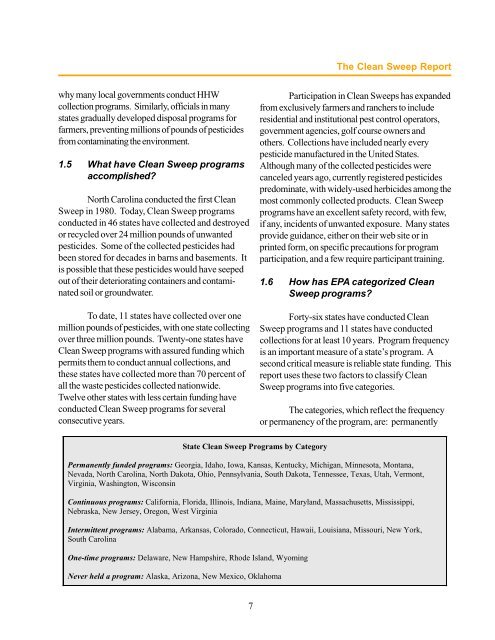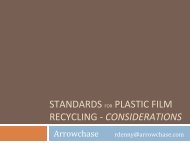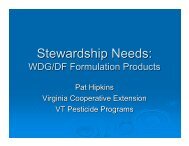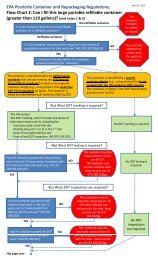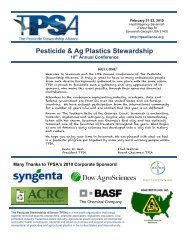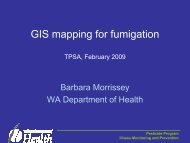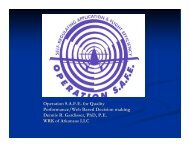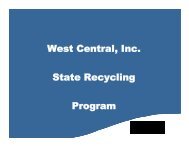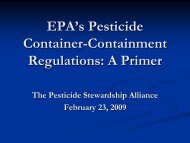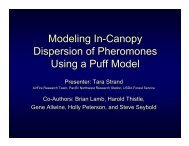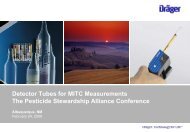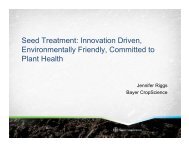Clean Sweep Programs - US Environmental Protection Agency
Clean Sweep Programs - US Environmental Protection Agency
Clean Sweep Programs - US Environmental Protection Agency
- No tags were found...
You also want an ePaper? Increase the reach of your titles
YUMPU automatically turns print PDFs into web optimized ePapers that Google loves.
The <strong>Clean</strong> <strong>Sweep</strong> Reportwhy many local governments conduct HHWcollection programs. Similarly, officials in manystates gradually developed disposal programs forfarmers, preventing millions of pounds of pesticidesfrom contaminating the environment.1.5 What have <strong>Clean</strong> <strong>Sweep</strong> programsaccomplished?North Carolina conducted the first <strong>Clean</strong><strong>Sweep</strong> in 1980. Today, <strong>Clean</strong> <strong>Sweep</strong> programsconducted in 46 states have collected and destroyedor recycled over 24 million pounds of unwantedpesticides. Some of the collected pesticides hadbeen stored for decades in barns and basements. Itis possible that these pesticides would have seepedout of their deteriorating containers and contaminatedsoil or groundwater.To date, 11 states have collected over onemillion pounds of pesticides, with one state collectingover three million pounds. Twenty-one states have<strong>Clean</strong> <strong>Sweep</strong> programs with assured funding whichpermits them to conduct annual collections, andthese states have collected more than 70 percent ofall the waste pesticides collected nationwide.Twelve other states with less certain funding haveconducted <strong>Clean</strong> <strong>Sweep</strong> programs for severalconsecutive years.Participation in <strong>Clean</strong> <strong>Sweep</strong>s has expandedfrom exclusively farmers and ranchers to includeresidential and institutional pest control operators,government agencies, golf course owners andothers. Collections have included nearly everypesticide manufactured in the United States.Although many of the collected pesticides werecanceled years ago, currently registered pesticidespredominate, with widely-used herbicides among themost commonly collected products. <strong>Clean</strong> <strong>Sweep</strong>programs have an excellent safety record, with few,if any, incidents of unwanted exposure. Many statesprovide guidance, either on their web site or inprinted form, on specific precautions for programparticipation, and a few require participant training.1.6 How has EPA categorized <strong>Clean</strong><strong>Sweep</strong> programs?Forty-six states have conducted <strong>Clean</strong><strong>Sweep</strong> programs and 11 states have conductedcollections for at least 10 years. Program frequencyis an important measure of a state’s program. Asecond critical measure is reliable state funding. Thisreport uses these two factors to classify <strong>Clean</strong><strong>Sweep</strong> programs into five categories.The categories, which reflect the frequencyor permanency of the program, are: permanentlyState <strong>Clean</strong> <strong>Sweep</strong> <strong>Programs</strong> by CategoryPermanently funded programs: Georgia, Idaho, Iowa, Kansas, Kentucky, Michigan, Minnesota, Montana,Nevada, North Carolina, North Dakota, Ohio, Pennsylvania, South Dakota, Tennessee, Texas, Utah, Vermont,Virginia, Washington, WisconsinContinuous programs: California, Florida, Illinois, Indiana, Maine, Maryland, Massachusetts, Mississippi,Nebraska, New Jersey, Oregon, West VirginiaIntermittent programs: Alabama, Arkansas, Colorado, Connecticut, Hawaii, Louisiana, Missouri, New York,South CarolinaOne-time programs: Delaware, New Hampshire, Rhode Island, WyomingNever held a program: Alaska, Arizona, New Mexico, Oklahoma7


